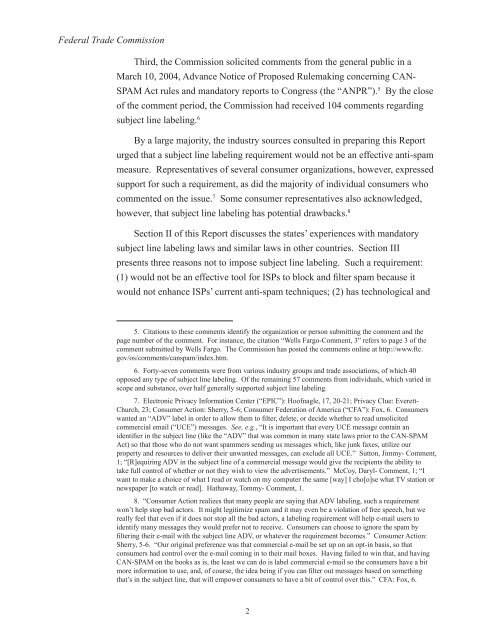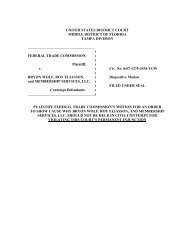HELO RCPT TO QUIT MAIL FROM DATA - Federal Trade Commission
HELO RCPT TO QUIT MAIL FROM DATA - Federal Trade Commission
HELO RCPT TO QUIT MAIL FROM DATA - Federal Trade Commission
Create successful ePaper yourself
Turn your PDF publications into a flip-book with our unique Google optimized e-Paper software.
<strong>Federal</strong> <strong>Trade</strong> <strong>Commission</strong><br />
Third, the <strong>Commission</strong> solicited comments from the general public in a<br />
March 10, 2004, Advance Notice of Proposed Rulemaking concerning CAN-<br />
SPAM Act rules and mandatory reports to Congress (the “ANPR”). 5 By the close<br />
of the comment period, the <strong>Commission</strong> had received 104 comments regarding<br />
subject line labeling. 6<br />
By a large majority, the industry sources consulted in preparing this Report<br />
urged that a subject line labeling requirement would not be an effective anti-spam<br />
measure. Representatives of several consumer organizations, however, expressed<br />
support for such a requirement, as did the majority of individual consumers who<br />
commented on the issue. 7 Some consumer representatives also acknowledged,<br />
however, that subject line labeling has potential drawbacks. 8<br />
Section II of this Report discusses the states’ experiences with mandatory<br />
subject line labeling laws and similar laws in other countries. Section III<br />
presents three reasons not to impose subject line labeling. Such a requirement:<br />
(1) would not be an effective tool for ISPs to block and filter spam because it<br />
would not enhance ISPs’ current anti-spam techniques; (2) has technological and<br />
5. Citations to these comments identify the organization or person submitting the comment and the<br />
page number of the comment. For instance, the citation “Wells Fargo-Comment, 3” refers to page 3 of the<br />
comment submitted by Wells Fargo. The <strong>Commission</strong> has posted the comments online at http://www.ftc.<br />
gov/os/comments/canspam/index.htm.<br />
6. Forty-seven comments were from various industry groups and trade associations, of which 40<br />
opposed any type of subject line labeling. Of the remaining 57 comments from individuals, which varied in<br />
scope and substance, over half generally supported subject line labeling.<br />
7. Electronic Privacy Information Center (“EPIC”): Hoofnagle, 17, 20-21; Privacy Clue: Everett-<br />
Church, 23; Consumer Action: Sherry, 5-6; Consumer Federation of America (“CFA”): Fox, 6. Consumers<br />
wanted an “ADV” label in order to allow them to filter, delete, or decide whether to read unsolicited<br />
commercial email (“UCE”) messages. See, e.g., “It is important that every UCE message contain an<br />
identifier in the subject line (like the “ADV” that was common in many state laws prior to the CAN-SPAM<br />
Act) so that those who do not want spammers sending us messages which, like junk faxes, utilize our<br />
property and resources to deliver their unwanted messages, can exclude all UCE.” Sutton, Jimmy- Comment,<br />
1; “[R]equiring ADV in the subject line of a commercial message would give the recipients the ability to<br />
take full control of whether or not they wish to view the advertisements.” McCoy, Daryl- Comment, 1; “I<br />
want to make a choice of what I read or watch on my computer the same [way] I cho[o]se what TV station or<br />
newspaper [to watch or read]. Hathaway, Tommy- Comment, 1.<br />
8. “Consumer Action realizes that many people are saying that ADV labeling, such a requirement<br />
won’t help stop bad actors. It might legitimize spam and it may even be a violation of free speech, but we<br />
really feel that even if it does not stop all the bad actors, a labeling requirement will help e-mail users to<br />
identify many messages they would prefer not to receive. Consumers can choose to ignore the spam by<br />
filtering their e-mail with the subject line ADV, or whatever the requirement becomes.” Consumer Action:<br />
Sherry, 5-6. “Our original preference was that commercial e-mail be set up on an opt-in basis, so that<br />
consumers had control over the e-mail coming in to their mail boxes. Having failed to win that, and having<br />
CAN-SPAM on the books as is, the least we can do is label commercial e-mail so the consumers have a bit<br />
more information to use, and, of course, the idea being if you can filter out messages based on something<br />
that’s in the subject line, that will empower consumers to have a bit of control over this.” CFA: Fox, 6.<br />
2

















